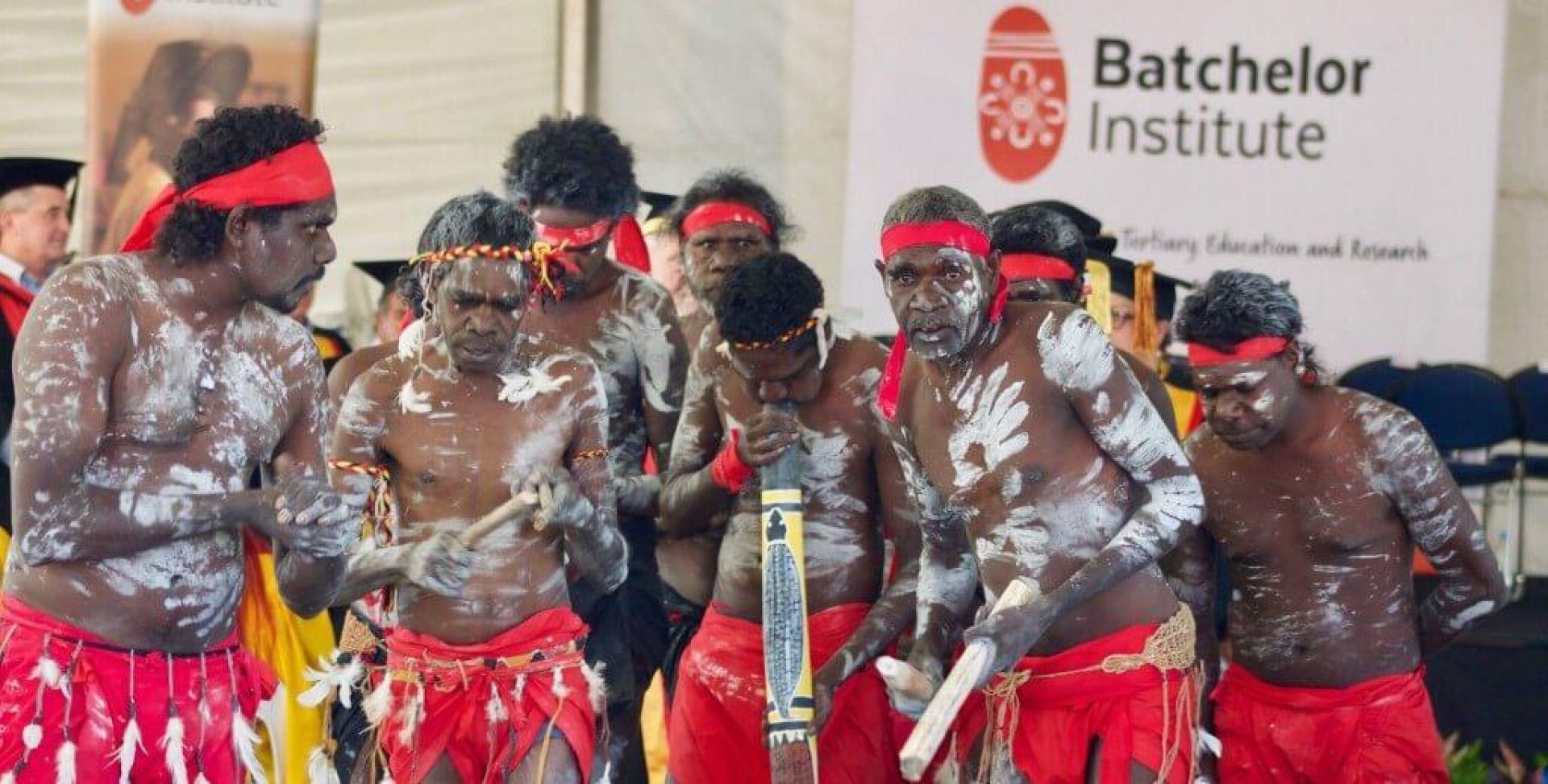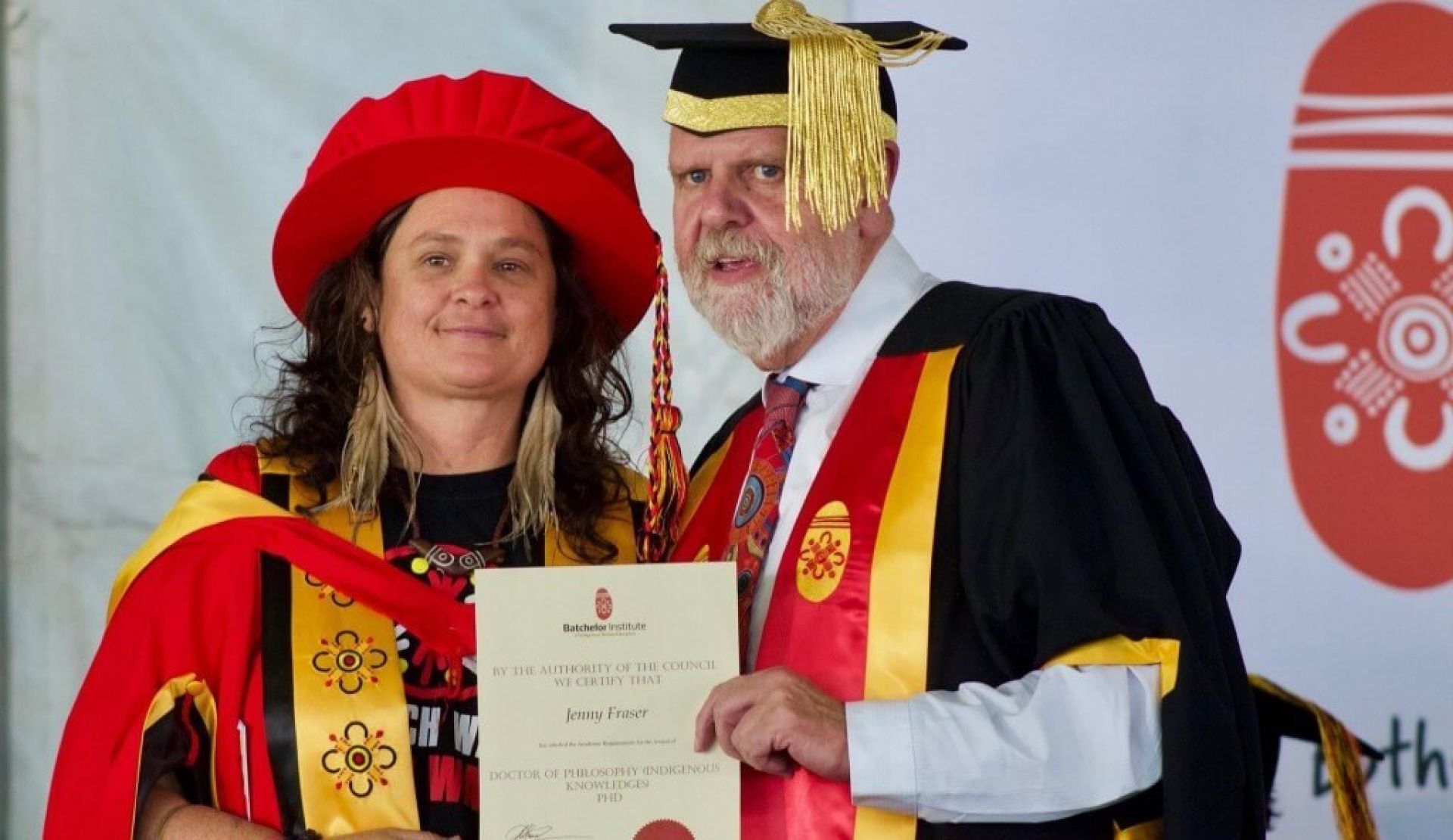

The achievements of students from the Batchelor Institute of Indigenous Tertiary Education were celebrated at the year’s largest graduation ceremony on June 15th 2017.
313 individual graduates had 350 awards conferred to them by the Batchelor Institute Council at the Batchelor Campus. Graduates came from 79 communities across four States/Territories, with most students coming from the Northern Territory and a large portion coming from communities that are in a remote or very remote area of Australia.
This years’ graduating cohort, the majority of which identify as Aboriginal and Torres Strait Islander, is amongst the largest the Batchelor Institute has seen in its over 40-year history of providing Indigenous education in the Northern Territory. Batchelor Institute celebrated a record number of completions for 2016, with 1000 students finishing their qualifications.
Traditional Owner and Elder Executive Advisor Academic and Cultural Leadership Dr Sue Stanton gave the Welcome to Country.
Batchelor Institute CEO Professor Robert Somerville AM, FAIM delivered the introduction of the graduating class.
“You follow in the footsteps of more than 40 years of graduates from the Institute who have gone on to create a legacy we are proud of. This is the beginning of an exciting chapter of the rest of your lives,” said Prof. Somerville.
“Your success reflects the efforts of our staff, the support given by your family, friends, community and most importantly your hard work. You are the proof that our efforts have paid off and that our vision for First Nations Australians are being realised.”
This year Ms Jennifer Rita Fraser was awarded a Doctor of Philosophy in Indigenous Knowledges, and gave a heartfelt address to the audience.

Jenny Fraser was one of the first to enrol in the new PhD program at Batchelor Institute and has now completed Creative Research in her own topic the Art of Healing and Decolonisation. The framework presented in her PhD is that of service to Aboriginal artistic communities and offers opportunities for cultural maintenance through sharing narratives of contemporary conversations.
It offers a vision for alternative curatorial and creative discourses, and also outlines opportunities for Aboriginal self-representation in online and other gallery and community spaces.
At Batchelor Institute, graduation ceremonies combine European traditions with the cultures of Aboriginal and Torres Strait Islander communities, graphically demonstrating the Both-ways philosophy of Batchelor Institute. In particular, graduating students are encouraged to combine traditional decorations and regalia of their culture with their academic dress. Dance also forms a part of the overall ceremony, including its opening and closing moments. This year the Djilpin Arts dancers welcomed in the arrival of the academic procession and closed the ceremony with traditional dance.
Two graduating students, who were receiving their Certificate IV awards, have also been nominated for the NT Training Awards, which will be presented later this year.
Each year, special awards are sponsored in recognition of students’ outstanding achievements in their fields of study.
The Department of Trade, Business and Innovation VET Award went to Karen Rogers from Ngukurr. This award is sponsored by the Northern Territory Department of Trade, Business and Innovation in recognition of the most outstanding achievement by a VET Graduate.
The Koori Mail Award, presented by General Manager Naomi Moran, went to Daniel Wilson from Sawtell, recognising his outstanding achievements as a student enrolled in broadcasting or media studies.
The Harry Wilson Memorial Award went to Rita Oui from Kuranda. This award is sponsored by the Top End Aboriginal Bush Broadcasting Association (TEABBA) in recognition of an outstanding student in the Certificate III Media course.
Valerie Wunungmurra from Nhulunbuy won the NBC Consultants Award, which is sponsored by NBC Consultants in recognition of the most outstanding student that has completed a Certificate in Business.
The award levels range from a VET Certificate I to a Doctor of Philosophy in the areas of:
- Aboriginal Health Care and Family Wellbeing
- Business & Governance
- Creative Arts and Industries
- Community Services, Early Childhood
- Education & Training and Assessment
- Conservation and Land Management
- Construction & Resource and Infrastructure
- Vocational Pathways
This year around 65% of students chose to graduate at one of the main ceremonies held in June and September at the Batchelor or Desert Peoples Centre (Alice Springs) campuses.
Remaining students will attend ceremonies held in communities and 24% will come from NT Correctional facilities. Other completions come through a program run in Timor Leste that works to teach important English language skills to Timorese students or the Army Indigenous Development Program.
Words and images by Chelsea Heaney.
